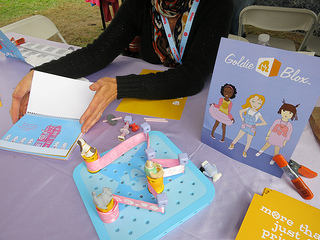Concluding an ongoing legal battle over a toy company’s potentially illegal use of a hit song created by the musical group Beastie Boys, the two parties have officially settled the lawsuit. According to a spokesperson for GoldieBlox, the settlement includes “the issuance of an apology posted to GoldieBlox’s website, [and] payment by GoldieBlox, based on a percentage of its revenues, to one or more charities selected by [the] Beastie Boys that support science, technology, engineering and mathematics education for girls (Blistein, Rolling Stone, 2014). The Beastie Boys song “Girls,” was first released in 1987 and included lyrics such as “Girls to do to this dishes…Girls to do the laundry” (Blistein, Rolling Stone, 2014). GoldieBlox altered the catchy song’s original lyrics to help promote the company’s incentive of empowering young girls to become more involved in the sciences and engineering industries. GoldieBlox’s video for the Princess Machine was eventually removed from the internet but not before the video went viral and garnered over seven million views.
According to an article in The Hollywood Reporter, “Beastie Boys say they were first alerted to the video when a representative from an advertising agency contacted Universal Music to ascertain whether GoldieBlox had obtained a license” (Gardner, The Hollywood Reporter, 2013). When the Beastie Boys first inquired about GoldieBlox’s sampling of their music, the toy company filed a preemptive official lawsuit for fair use in commercial speech. In order to determine if their use of the song was indeed fair use, the judge needed to examine four factors of fair use: “the purpose and characters of the use, the nature of the copyrighted work, the amount and substantiality of the portion taken and the effect of the use upon the potential market” (Gardner, The Hollywood Reporter, 2013). In response to GoldieBlox’s preemptive lawsuit, the Beastie Boys filed a counterclaim against the company. As cited in the Gardner’s article, the band released a letter that said, “When we tried to simply ask how and why our song ‘Girls” had been used in your ad without our permission, YOU sued US” (The Hollywood Reporter, 2013).
The Beastie Boys counterclaim included accusations that GoldieBlox’s use of “Girls” misled consumers to believe that GoldieBlox had a professional relationship with the Beastie Boys. Additional claims include “copyright and trademark infringement, unfair competition and misappropriation of publicity rights” (Gardner, The Hollywood Reporter, 2013). Other legal considerations included GoldieBlox’s use of the song to obtain financial profits and additional benefits to the company. Beastie Boys legal parties argued that despite GoldieBlox’s intended message to help girls grow an interest in scientific careers, their use of the song helped to promote their toy. Moreover, Beastie Boys parties pointed out that GoldieBlox’s reuse of the song “condones and encourages stealing from others” (Blistein, Rolling Stone, 2014). As Gardner noted, “if using copyrighted works without a license was as easy as making a social point, surely a lot of corporations would try to get away with that” (The Hollywood Reporter, 2013).

